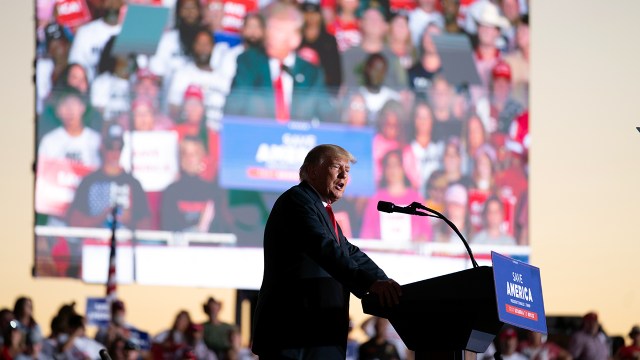
Note: For the latest data on this topic, read our 2022 post, Before midterms, Trump’s image among Republicans had become less positive
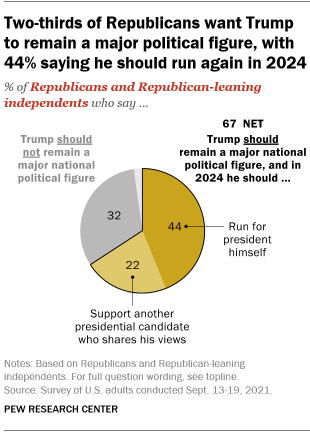
Two-thirds of Republicans and Republican-leaning independents say they would like to see former President Donald Trump continue to be a major political figure for many years to come, including 44% who say they would like him to run for president in 2024, according to a Pew Research Center survey of U.S. adults conducted Sept. 13 to 19.
About one-in-five Republicans (22%) say that while they would like Trump to continue to be a major political figure in the United States, they would prefer he use his stature to support another presidential candidate who shares his views in the 2024 election rather than run for office himself. About a third of Republicans (32%) say they would not like Trump to remain a national political figure for many years to come.
Pew Research Center conducted this study to understand the public’s opinions on Donald Trump’s political future, including whether he should potentially run for president in 2024. This study also examines what Republicans and Democrats consider acceptable behavior for elected officials within their own parties. For this analysis, we surveyed 10,371 U.S. adults in September 2021. Everyone who took part in this survey is a member of the Center’s American Trends Panel (ATP), an online survey panel that is recruited through national, random sampling of residential addresses. This way nearly all U.S. adults have a chance of selection. The survey is weighted to be representative of the U.S. adult population by gender, race, ethnicity, partisan affiliation, education and other categories. Read more about the ATP’s methodology.
Here are the questions used for the report, along with responses, and its methodology.
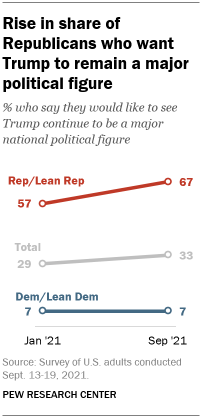
The share of Republicans who say Trump should continue to be a major national figure has grown 10 percentage points – from 57% to 67% – since a January survey that was conducted in the waning days of his administration and in the immediate wake of the Jan. 6 riot at the U.S. Capitol.
Views among Democrats and Democratic-leaning independents are essentially unchanged over this time period. Today, 92% of Democrats say they would not like to see Trump continue to be a major national political figure in the future, while just 7% say they would like to see this.
Among Republicans, views on whether Trump should continue to be a major political figure or run for office in the next presidential election vary by age, education and ideology.
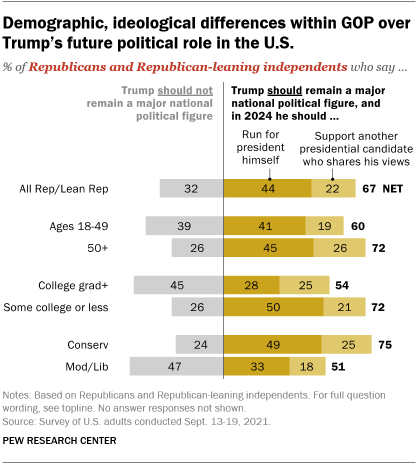
For example, 72% of Republicans with some college experience or less (who make up a clear majority of Republicans) say Trump should be a major figure, with half saying he should run for president in 2024. By contrast, a narrower majority (54%) of Republicans with a college degree or more say Trump should remain a prominent figure, including just 28% who say he should run for office in the next presidential election.
Among conservative Republicans, there is widespread support for Trump remaining a national political figure: Three-quarters prefer this, including 49% who say he should run for president again in 2024. Moderate and liberal Republicans are more divided: 51% say he should play an ongoing political role, with 33% saying he should run for president himself in 2024; 47% say he should not continue to play a major political role.
Nearly two-thirds of Republicans say their party should not be accepting of elected officials who criticize Trump
A 63% majority of Republicans say their party should be not too (32%) or not at all (30%) accepting of elected officials who openly criticize Trump, according to the new survey. Just 36% of Republicans say the GOP should be very (11%) or somewhat (26%) accepting of officials who do so.
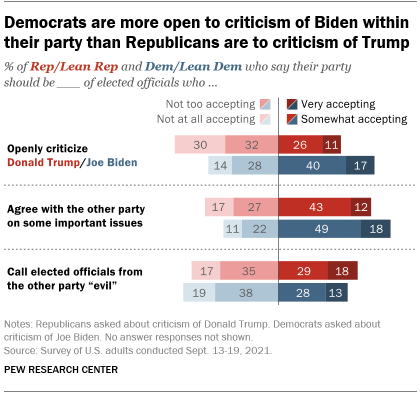
By contrast, about six-in-ten Democrats say the Democratic Party should be very (17%) or somewhat accepting (40%) of Democratic elected officials who openly criticize President Joe Biden.
Majorities of Republicans and Democrats alike say their party should be accepting of elected officials who agree with the other party on important issues. Two-thirds of Democrats say the Democratic Party should be accepting of Democratic officials who agree with the GOP on important issues. A slimmer majority of Republicans (55%) say the GOP should be accepting of officials who agree with Democrats on some important issues.
The survey also asked about the acceptability of elected officials from one party calling their counterparts in the other party “evil.” A majority of Democrats (57%) and about half of Republicans (52%) say their parties should be not too or not at all accepting of officials who do this.
About four-in-ten Democrats (41%) say their party should be accepting of elected officials in their own party who call GOP officials evil, with 13% saying their party should be very accepting of this. Among Republicans, 46% say their party should be accepting of officials who call their Democratic counterparts evil, including 18% who say the party should be very accepting of these officials.
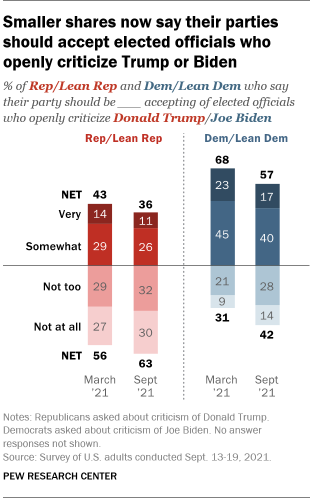
The share of Republicans who say their party should be accepting of elected officials who openly criticize Trump has declined since March. Today, 36% of Republicans say it is at least somewhat acceptable for Republican elected officials to openly criticize Trump, down from 43% earlier this year.
There has also been a decline in the share of Democrats who say their party should be accepting of Democratic elected officials who openly criticize Biden. A narrow majority of Democrats (57%) say this is acceptable, down from 68% in March.
Note: Here are the questions used for the report, along with responses, and its methodology.
CORRECTION: (Dec. 20, 2021): In the chart “Demographic, ideological differences within GOP over Trump’s future political role in the U.S.,” the age label for “50+” has been updated to correct a typographical error. This change did not affect any findings reported in the text.
